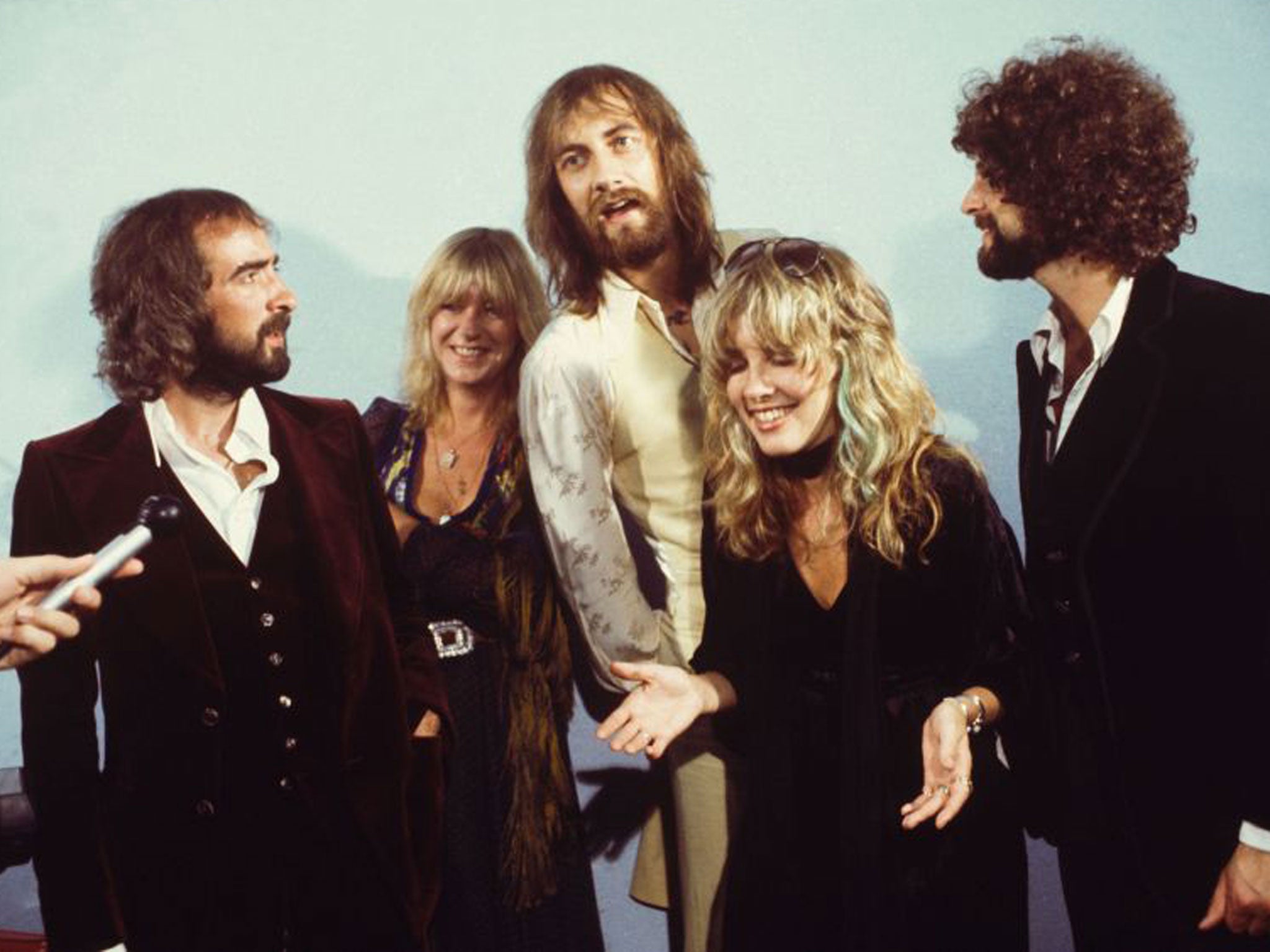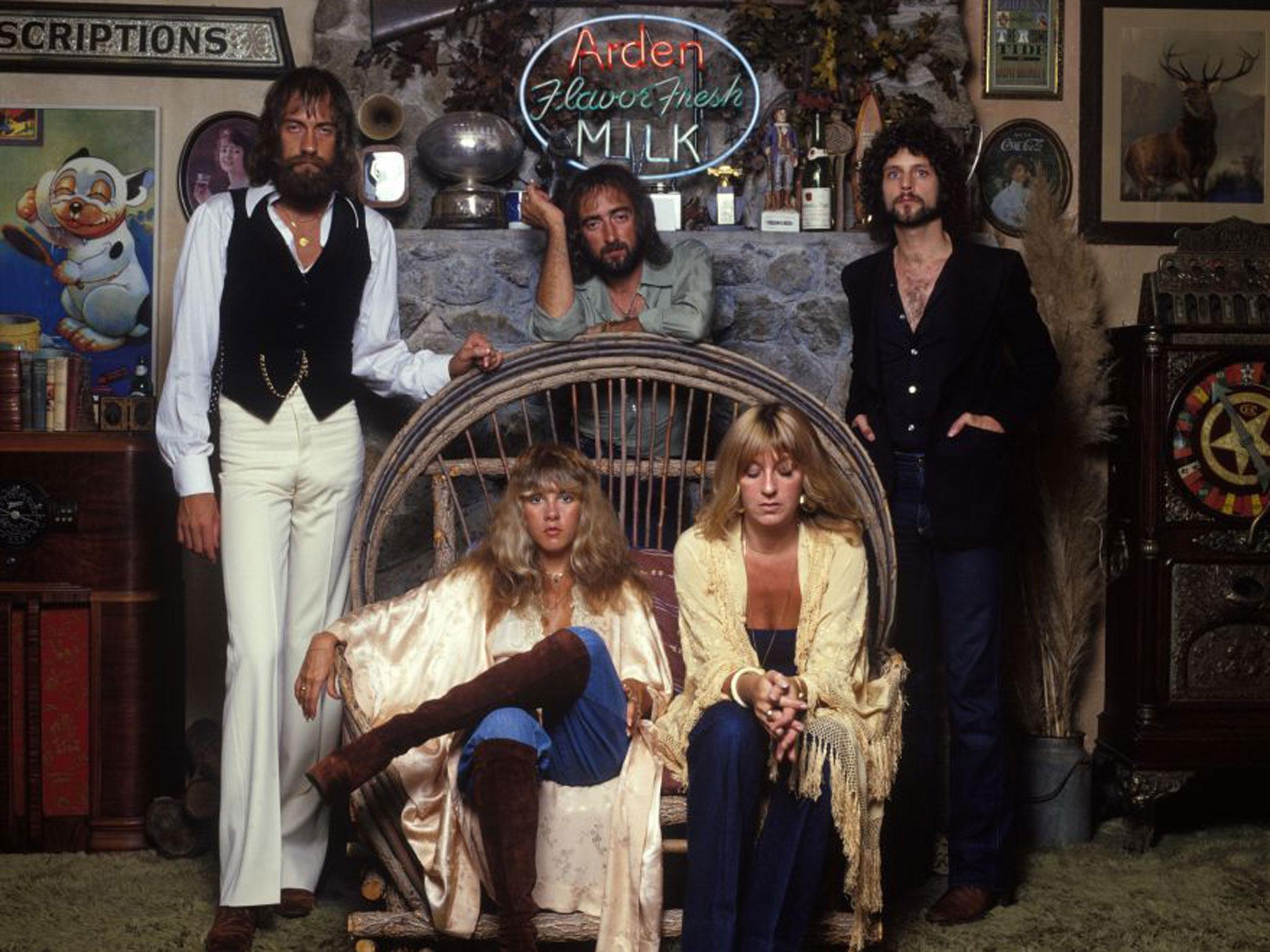Don’t Stop: 50 years on, Fleetwood Mac are still rising from the ashes of their own self-destruction
The storied band, who are about to embark on a European tour, have found a home for themselves teetering on the brink of implosion – unwilling, or perhaps unable, to let each other go. Their new anniversary album, '50 Years – Don't Stop', could hardly be more aptly titled, writes Alexandra Pollard


Affairs, breakups, terrifying brawls between lovers, damage to instruments (and skulls), divorce, drug abuse, alcoholism, rows about money, musical differences, and lots and lots and lots of hit records: Fleetwood Mac might have sounded mellow at times, but off stage they were anything but.
“We’re a group of people who, you could make the argument, don’t belong in the same band together,” Lindsey Buckingham once said of his fractious group. “It’s the synergy of that that makes it work.”
Whether they’ve triumphed because of their famously volatile relationship, or in spite of it, Fleetwood Mac have risen from the ashes of their own self-destruction more times than seemed possible. In the past 50 years, they have found a home for themselves teetering on the brink of implosion – unwilling, or perhaps unable, to let each other go. Their new anniversary album, 50 Years – Don’t Stop, released a month after they announced a 2019 European tour, could hardly be more aptly titled.
Not that the current members haven’t tried to stop. Stevie Nicks left the band in 1990 over a dispute with Mick Fleetwood, but rejoined a few years later. Guitarist Lindsey Buckingham quit in 1987, just before the band’s world tour, to “get on with the next phase of my creative growth” – only to spearhead a reunion a decade later. When Christine McVie packed the whole thing in 1998, she even went as far as moving to a sleepy village in Kent. “There’s no more chance of [McVie returning],” said Stevie Nicks in 2012, “than an asteroid hitting the earth.” A little over a year later, McVie was back in the band, no asteroid in sight.
In the early days, of course, some members left for good. When Fleetwood Mac first formed in London in 1968, so constantly changing was its line-up that “List of Fleetwood Mac members” (there have been 18 of them) is its own Wikipedia page.
After suffering a drug-induced mental decline, founding member Peter Green – who led the band through their early blues-rock era (songs such as “Somebody’s Gonna Get Their Head Kicked in Tonight” could hardly be more different to the pop-rock sound the band would later develop) – left in 1970.
Guitarist Danny Kirwan was fired in 1972 after smashing both his guitar, and his head, on a dressing room wall before a gig. Singer and guitarist Bob Welch, who had become increasingly estranged from John and Christine McVie and whose marriage was failing, resigned in 1974, and was replaced by LA singer-songwriter duo Stevie Nicks and Lindsey Buckingham. And that’s when the turbulence really started.

When Fleetwood Mac released Rumours in 1977, the album was a portrait of a group in crisis. Christine and John McVie were divorcing, McVie was having an affair with the band’s sound engineer, and Nicks and Buckingham were breaking up too. All but one of the album’s tracks were written by individual members, taking lyrical swipes at one another in song, and then expecting the subject of their vitriol to help play it.
“Go Your Own Way” was written by Buckingham as a thinly veiled attack on Nicks. She later said: “Every time those words would come onstage, I wanted to go over and kill him.” Instead, she sang harmonies – and then wrote her own counter-attack in the form of “Dreams” (“But listen carefully to the sound of your loneliness … Remembering what you had and what you lost”). John McVie played bass on “You Make Loving Fun”, a song his wife, Christine, had written about her affair. The process was an unmitigated mess – but the album was a masterpiece.
The album’s follow-up, 1977’s Tusk, the most expensive rock album recorded to that date, was clouded with drama too. It sold four million copies, an impressive sales figure by any other standard, but because it followed in the footsteps of the 10 million-selling Rumours, it was deemed a commercial failure by the label.
Stymied by both their success and their failures, the band spiralled further into drug addiction. They took to stashing velvet bags of cocaine under their mixing desk to allow immediate access to the drug while they recorded. In his memoir, Mick Fleetwood estimated that if you collected all the cocaine he had taken over the course of 20 years and laid it out, it would stretch for seven miles. “All of us were drug addicts,” said Nicks, “but there was a point where I was the worst drug addict. I was a girl, I was fragile, and I was doing a lot of coke. And I had that hole in my nose. So it was dangerous.” While they recorded 1987’s Tango in the Night, Nicks would do shots, and record her vocal takes paralytic.
At many points during this drug-addled, characteristically fractious period, Fleetwood Mac told themselves that they were done. And then they kept making records.
50 Years – Don’t Stop covers all of this, spanning from the band’s early material, through their most commercially successful period in the Seventies all the way up to 2013 (when the band were still aiming jabs at each other in the press). The 50-track compilation is the sound of a band pulling themselves apart, and putting themselves back together, over the course of half a century.
But demand for such an extensive compilation wasn’t always guaranteed. The band’s reputation has vacillated almost as wildly as their relationships. At the height of their success, in fact, they were decidedly uncool. Rumours coincided with the arrival of punk and a declining appetite for slick California pop, rendering Fleetwood Mac – in the words of Buckingham himself – “incredibly unhip”. It was only recently that they gained almost universal approval, uniting music buffs, hipsters, baby boomers and millennials.
As a result, the band’s sound has seeped into that of modern popstars. Harry Styles’s self-titled solo album owes a huge debt to the Mac. As if to confirm the band’s impact on him, he performed “The Chain” onstage during his recent solo tour. Lorde is inspired by them too: “Every song had a place in my heart, in the fabric of my childhood and my family life,” she said of Rumours.
Elsewhere, Florence + the Machine is unmistakably influenced, both musically and aesthetically, by Stevie Nicks. “There’s something about Stevie that’s really pure,” singer Florence Welch told Rolling Stone. “When she sings, she sounds angelic but also wild and free.” You can hear them in Haim’s every riff too. “I get squeamish when people say that,” said their singer Danielle Haim of the comparisons. “Fleetwood Mac are one of the greatest bands out there.”
And yet it seems unlikely that any of the artists so influenced by Fleetwood Mac could go through the same turmoil and emerge intact. “Can you imagine if we’d done Rumours in today’s climate?” said Buckingham. “Oh my lord.” These days, bands tend to present an amiable veneer, lest social media and the tabloid press pounce. Sure, a few attempt to capitalise on rift rumours (see Fifth Harmony launching a Camila Cabello stand-in off the stage at the VMAs), but so fervent is the 24-hour news cycle that the ones that do quickly implode.
Through whichever lens they’re being examined, though, Fleetwood Mac’s explosive chemistry is unique. Somehow, it has always been through exposing their quarrels, and diving headfirst into their fractured relationship, that the band have thrived. “It was much of the attraction, and much of the fuel for our material,” Buckingham said a few years ago of the band’s rocky relationship. “Not very far below that level of dysfunction is what really exists, which is love.”
That love, of course, is as precarious now as ever. Buckingham is suing his bandmates for millions of dollars, after they ejected him ahead of their current US tour. No doubt he’ll be back. For Fleetwood Mac, playing music and falling out are inextricably linked.
“I’m sensing that a lot of the drama from the band’s past is gone,” an interviewer observed to Stevie Nicks a few years ago. “Well, don’t seriously fall for that,” she warned him. “We’re a dramatic bunch.” Long may it continue.
50 Years – Don't Stop, the Fleetwood Mac anniversary album, is out now. The band tour the UK in June 2019
Join our commenting forum
Join thought-provoking conversations, follow other Independent readers and see their replies
Comments
Bookmark popover
Removed from bookmarks